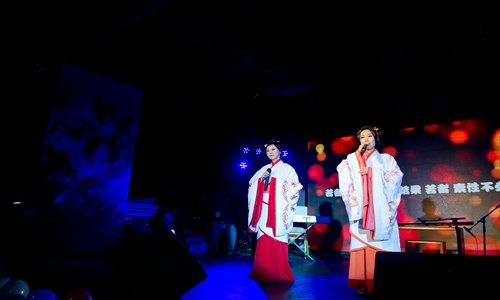 |
|
Gufeng singers perform at MMQMusic's new year concert in Beijing on Dec 31, 2012. Photo: Courtesy of MMQMusic
|
A new type of music, gufeng (roughly translated as a nostalgic trend), is finding its way online. What now seems like a movement began rather quietly in 2005, calling for netizens to write lyrics with ancient-styled poems for the music in some popular PC games, including The Legend of Sword and Fairy and Sword of Xuanyuan.
As a lyricist Qishi recalled, the early gufeng music lovers are fans of games who gather at fenbei.com (a now closed music sharing website) and the BBS (Bulletin Board System) of The Legend of Sword and Fairy.
"There was a group on fenbei.com called Gufeng Tianci (write lyrics using classical Chinese), and the basic concept of gufeng among netizens came out from that group."
"The early creation of gufeng music focused on lyrics, but that was not the key to setting up a new style of music," according to Wellson Cao, also known as Diuz, the leader of the music group Mo Ming Qi Miao (MMQMusic).
Readily available midi software made it possible for music lovers to compose, record and mix the music at home, allowing more netizens take part in creating gufeng music. It can be heard on music sharing websites like kugou.com or 5sing.com.
Hard to define
It is hard to have a consensus among all the composers how to define gufeng music.
Lu Xiaoxu, the head of Beijing Xiao Xu Music Culture Company, gave his definition for gufeng: "In broader terms, I think gufeng music should be called zhongguofeng (China trend), which is a type of pop music using traditional Chinese musical instruments, while in a narrower sense it means a group of music lovers online who cover, perform, rework and compose the genre."
"Jay Chou is the originator of zhongguofeng music. He mixes traditional Chinese elements with pop music very well and promotes this kind of music to the mainstream," said Lu.
But Huiyuanqiong, a popular gufeng composer, distinguishes the style from zhongguofeng saying it cannot be grouped with pop music.
For Cao, gufeng is a style that shows aesthetic appreciation for nostalgic music and expresses it with ancient imagery. "We are not only using music and lyrics, but also dialogue and narrative to describe a story or a scene we want to show to our audience," Cao told the Global Times.
Lyricists also hold different views. Bu Lei, known as Ediq online, thinks he would like to use modern language to show one's feeling on ancient issues in gufeng music while Anjiu, another lyricist and composer, thinks it would be better to stay in classic Chinese style when expressing nostalgic views.
We recommend:
